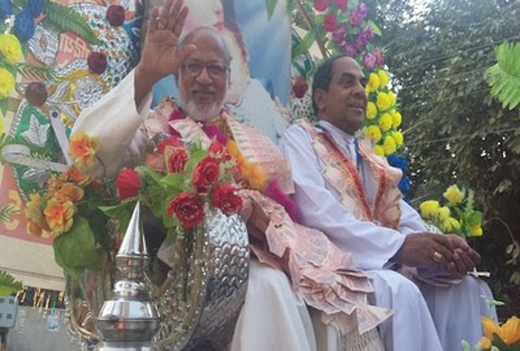Cardinal Alencherry stresses collective action of all ’rites’
Mangalore Today News Network
New Delhi, Oct 29, 2016: Catholics of all three rites in India should collaborate and become open to cultural diversities for effective evangelization work, says the head of the Eastern-rite Syro-Malabar Church.

"It is the need of the hour. All the churches are doing the Lord’s work. Let us not have an exclusive attitude of evangelization work," Cardinal George Alencherry, head of the Syro-Malabar Church told media during the Oct. 16-18 "national mission" consultation in Punjab.
"The church is not a monolithic reality," he said stressing the need for local churches to be open to a cultural diversity of faith.
The consultation, organized by the Syro-Malabar Archdiocese of Faridabad, also marked the need to foster the "ad gentes" spirit and vocation of missioners, especially as the church is commemorating the golden jubilee of "Ad Gentes," the Second Vatican Council’s Decree on the Mission Activity of the Church. Mission ad gentes generally refers to missionary outreach to people who are not Christians and helped the Eastern-rite churches open missions and dioceses outside its base in Kerala.
Rivalry and tension has often marked relations between India’s two Eastern-rites with the larger Latin-rite that has on many occasions opposed the Syro-Malabar and Syro-Malankara churches having missions outside Kerala, seen collectively as Latin-rite territory.
The Church in India comprises Latin, Syro-Malabar and Syro-Malankara rites. The Latin rite follows the Roman liturgy that European missioners introduced in the 15th century. The other two Eastern rites, based in Kerala, southern India, follow Syrian church traditions and trace their origins to St. Thomas the Apostle.
The Second Vatican Council stressed the evangelization rights of all Catholics and underlined the freedom of all rites to engage in the mission of the church, paving the way for establishing the first Syro-Malabar diocese outside Kerala in 1972.
Faridabad Diocese based in Delhi was set up in 2012 to cover most of northern India. During the same period, the Syro-Malankara Church also established the Gurgaon Diocese near Delhi to help it work in northern India.
Syro-Malabar Archbishop Kuriakose Bharanikulangara of Faridabad, Syro-Malabar Bishop Sebastian Vadakel of Ujjain and Latin-rite Archbishop Albert D’Souza of Agra were among some of the 200 missionaries who attended the seminar.
Despite Indian Christians tracing their faith to apostolic times of St. Thomas and St. Bartholomew, Christians number 27 million, less than three percent of India’s 1.2 billion people.
Half of them are in four southern Indian states, making their presence in northern states such as Punjab well below one percent of the population.
Hence, Archbishop Bharanikulangara told media, the Catholic Church collectively has to reach out to a maximum number of people.
- Mangaluru: Safety supervisor of NH works alleges assault by traffic cop
- Kasargod acid attack: Woman critical after assault by stalker who later dies by suicide
- Mangaluru: Car fatally knocks down woman at Kuthar
- Special prayers in temples seeking divine blessings for Indian defence forces
- Pope Leo XIV: US Cardinal Robert Prevost elected as the new pope
- Rs 116 crore grant for development of Karkala’s Anekere and Varanga Jain Temples
- Suhas Shetty case: MLAs from DK and Udupi to meet Governor on May 9, seek NIA probe
- Security stepped up across the coast of the state
- DK administration inks MoU with NITK to set up civic think tank consortium
- Police Commissioner warns against provocative, threatening social media posts
- Sullia: 1 dies; 2 injured in collision between cars
- Provocative posts: 2 more FIRs filed in Mangaluru
- Kantara Chapter 1 junior artiste drowns in Sowparnika river
- IPL 2025 suspended indefinitely amid escalation in India-Pakistan tensions
- 7 terrorists, backed by Pak rangers, shot dead trying to infiltrate in Jammu
- Karnataka to hold first-ever survey of persons with disabilities
- X says it blocked 8,000 accounts in India after government’s executive orders
- The S-400 defence system used by India to neutralise Pak missiles
- Firing at LoC hours after India foils Pak attack
- 24 airports shut in India amid escalating India-Pakistan tensions | Full list
- Overnight Naval ops in Arabian Sea after Pak tries to attack India: Sources
- India neutralises Pak drones and missiles aimed at 15 cities, destroys Air Defence system
- Film on Operation Sindoor, 15 bollywood studios rush to register title
- Indian Armed Forces target air defence systems in Pakistan as unprovoked firing along LoC increases
- 100 terrorists killed, Rajnath Singh tells all-party meet on op Sindoor
- Skills and Competencies Take Center Stage at MSN Dialogue Series
- Court remands Maoist Lakshmi to six-day police custody
- Sandhya Shenoy honored with Society for Materials Chemistry Medal-2024
- White Cornus Apartment in Mangaluru
- City girl wins first place in state-level spell bee competition
- Alleged ‘Love Jihad’ Case in Mangaluru: Woman left home voluntarily, says police
- Girl fatally struck by reckless two-wheeler near Belman
- New residential complex for the judges inaugurated in Mangaluru
- Absconding accused nabbed after 8 years
- Truck with cylinders turns turtle in Beltangady
- Bhoota Kola artist dies of cardiac arrest
- Development of the country should be our goal: Ganesh Karnik
- Container truck gets stuck under Modankap railway bridge
- Truck crushes bike’s pillion rider near BC Road
- Head constable dies of heart attack
- CITY INFORMATION
- TRAVEL
- TOURIST INFORMATION
- HEALTH CARE
- MISCELLANEOUS




 Write Comment
Write Comment E-Mail To a Friend
E-Mail To a Friend Facebook
Facebook Twitter
Twitter  Print
Print 


